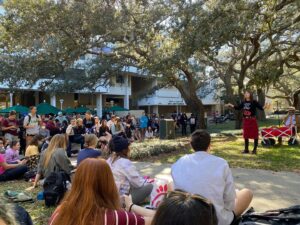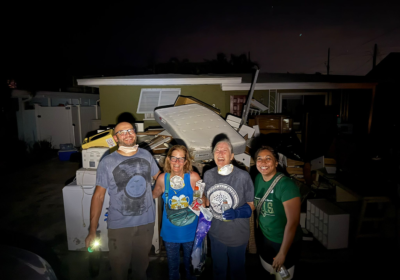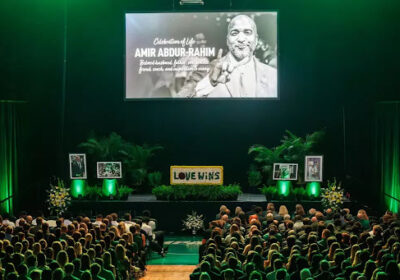On-campus religious organizations attract criticism from students

Religious groups, from attention-grabbing preachers to those quietly handing out the New Testament from the sidewalk, have drawn criticism from students due to their actions, especially as this generation watches a departure from mainstream religion.
Students said religious organizations on campus tend to be overbearing, and that their presence is a nuisance. Freshman Andrew Russell said they often neglect debating with students in favor of simply trying to recruit new members.
“I wish so much that the presence of the various religious groups would lead to intellectually stimulating exchanges of ideas, cultures and beliefs,” Russell said.
“[However], it seems that some people or groups are so bent on converting others that they skip the whole intellectual exchange part [in favor of] brute force converting, as if the person is a commodity that is to be acquired by their church.”
Many students also said that while they might not enjoy the presence of religious groups on campus, they ultimately determined it was necessary to uphold First Amendment rights.
“You don’t have to respect what they say, but you have to respect their right to say it,” sophomore Roberto Montero said.
Dean of Students Danielle McDonald confirmed that under the First Amendment, religious groups and preachers have the right to spread their message on campus, regardless of the community’s feelings on the subject matter.
“As a public university, we have to allow free speech regardless of how we feel about [what they are trying to say] or how it is in direct conflict with our values of diversity and inclusion,” McDonald said. “These uninvited speakers are exercising their freedom of speech.”
However, this does not mean there are no university policies surrounding such events. These groups must abide by rules regarding whether or not they are permitted to use amplified sound in certain areas on campus, according to McDonald.
Services such as the Event Support Team will also be available to supervise preachers and similar groups. The team is a group of trained staff intended to provide information on the First Amendment and ensure students are provided with a safe academic environment.
McDonald said religion can play a critical formative role in a student’s life.
“Spirituality and faith are important development factors for students in college,” she said. “In order for students to feel the most satisfaction and success in college, they need to find a sense of belonging. For many students that is found in faith-based organizations.”
However, younger generations, particularly Generation Z, tend to avoid religious affiliations more than older generations. This is because of changing values that oppose the teachings of many mainstream religious denominations.
In author Nancy T. Ammerman’s book Empty Churches: Non-Affiliation in America, she proposes this departure from religious affiliations is largely due to issues surrounding personal choice, rather than disagreement with the religion itself. This has led to increased numbers of people who lack distinct religious affiliations, or religious “nones.”
“Many of the existing studies of the nones point out that having no preference for any existing organized religion is not so much about theological belief as about an embrace of individual autonomy and personal choice, especially in matters surrounding sexuality,” Ammerman said.
“It is the moral traditionalism of religious institutions and leaders, more than their conservative theology, that has driven those already minimally engaged to move outside the religious orbit entirely.”
Associate professor in the College of Psychology James Cavendish echoed these sentiments, saying religion is being left behind as cultural norms evolve.
“The younger generations are less accepting of religious authority, are less likely to adhere to any particular religious doctrines,” Cavendish said. “In many senses, the younger generations are most likely to feel that religious institutions are out of step with contemporary cultural beliefs and practices.”
Students and others beyond the university setting may be deterred by the involvement of religious rhetoric in politics.
“Some social scientists suspect that the uptick in the religious nones in the United States is in part due to what’s called the ‘Religious Right,’ and the fact that the far right has drawn on religion, particularly Protestant Evangelism, to spread its message,” Cavendish said.
By association, those who disagree with certain political ideologies may be more likely to reject the religions that they use, he said.
Department of Religious Studies Chair Michael DeJonge said these groups’ direct nature is used to attract and engage passing students.
DeJonge cited instructor in the Department of Religious Studies Tori Lockler, who has spoken to some of the groups. Members who usually show more aggressive behavior while advertising their faiths tend to be very polite in other settings, according to Lockler.
This is attributed to the belief that this kind of behavior will attract more attention and have their message reach more people. But this may not have the end result the religious groups expect, DeJonge said.
“It seems to me that whatever reaction they get is very short term too,” he said. “People will respond strongly the first time they encounter them, but then the novelty wears off and it just becomes background noise.”
Cavendish said the most likely result of such interactions is deterring students from learning more about these faiths.
Alida Coggins, who represented Catholic faith at Bulls Market on Wednesday, said she speaks to students out of what she considers necessity, and with good intentions. To her, communicating with students and earning their attention is a high-stakes endeavor.
“I would say that when we approach people on campus, we are doing it out of love and we really try to communicate that. And because we believe that what we’re saying is a matter of urgency, and a matter of someone’s eternity as well as someone’s life,” Coggins said.
McDonald cautioned students on how they interact with these groups, saying that while students often engage with them out of the potential amusement, they may inadvertently hurt their mental health.
“Students often tell me they are engaging with the speakers because they find it funny, but those same students are often emotionally invested in refuting the speech,” she said.
“As a student, you have to decide what your reaction is going to be, and is it worth the toll it might take on your well-being.”






